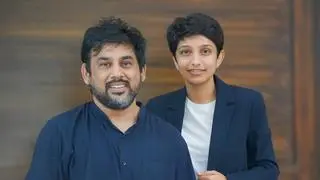Even today I feel I could have done well in sports, but my parents never knew how good I was at it,” Sudeep Kulkarni says, lamenting his lost chances.
Little wonder he founded Bengaluru-based startup Game Theory, hoping to save others from similar regrets.
Launched in 2018, the company has developed an AI-driven computer vision technology, called G.O.A.T Vision, which can capture one lakh frames per playing hour. This data, in turn, can help analyse the speed of a shot, distance covered, error rate, and win percentages, among other parameters. The data helps people view their abilities in a measurable format, Kulkarni explains.
Game Theory has 15 centres across Bengaluru and covers sports such as swimming, paddle tennis, tennis, table tennis, squash, basketball and pickleball.
“For coaching, we are building computer vision-based front-end applications. We can identify children’s abilities and show their parents the progress achieved, such as gains in speed and accuracy.”
He hopes the objective metrics can convince parents about their child’s potential, including a shot at the Olympics. “Our aim is to get people to play sports and identify future Olympians,” he says.
The goal is long-term in nature, he says. “We are approaching this from a 12-year perspective. We’ll be able to make an impact in the 2036 Olympics. What is being taught, and whether it is being taught the right way... all of it needs to be figured out.”
The centres coach children from age seven, although those as young as four can start off in badminton and tennis. The swimming programme, the startup’s most successful offering so far, includes babies as young as six months. Among adults, most are aged 24-34.
Community playing
The company addresses two different sporting needs — coaching and community playing. Its tech product helps people find fellow players with complementary skills to compete against and raise their gamesmanship.
Kulkarni says the company is currently rolling out this technology one centre at a time.
“We just have to calibrate each camera. Everything we do is dependent not on hardware but algorithms. We don’t have any high-speed cameras and that is why it is affordable,” he explains, adding that customers will not be charged extra for the technology.
The company has attracted interest and investment from sports personalities such as badminton player Pullela Gopichand, squash player Saurav Ghosal, table tennis player Sharath Kamal, and tennis player Rohan Bopanna.
Gopichand describes his investment as a step towards building a robust sports ecosystem in India. “Our country has seen significant growth in badminton over the last few years, with aspirations from across all economic strata to participate in the sport. To generate a large talent pool for the future, a strong grassroots programme is a necessity,” he says.
He believes that Game Theory’s technology can help in scouting for future talent and winning on a global scale. “We can now create a structured and highly personalised pathway to guide young athletes to excel globally, particularly at the Olympics,” he says.
In October 2023, Game Theory secured $2 million in a pre-Series A funding round, with investments from Nithin Kamath’s Rainmatter, Rohan Bopanna, WEH Ventures, Prequate Advisory, and angels such as Balakrishna Adiga. Before this, it had raised about $500,000 from Techstars and other angel investors.







Comments
Comments have to be in English, and in full sentences. They cannot be abusive or personal. Please abide by our community guidelines for posting your comments.
We have migrated to a new commenting platform. If you are already a registered user of TheHindu Businessline and logged in, you may continue to engage with our articles. If you do not have an account please register and login to post comments. Users can access their older comments by logging into their accounts on Vuukle.